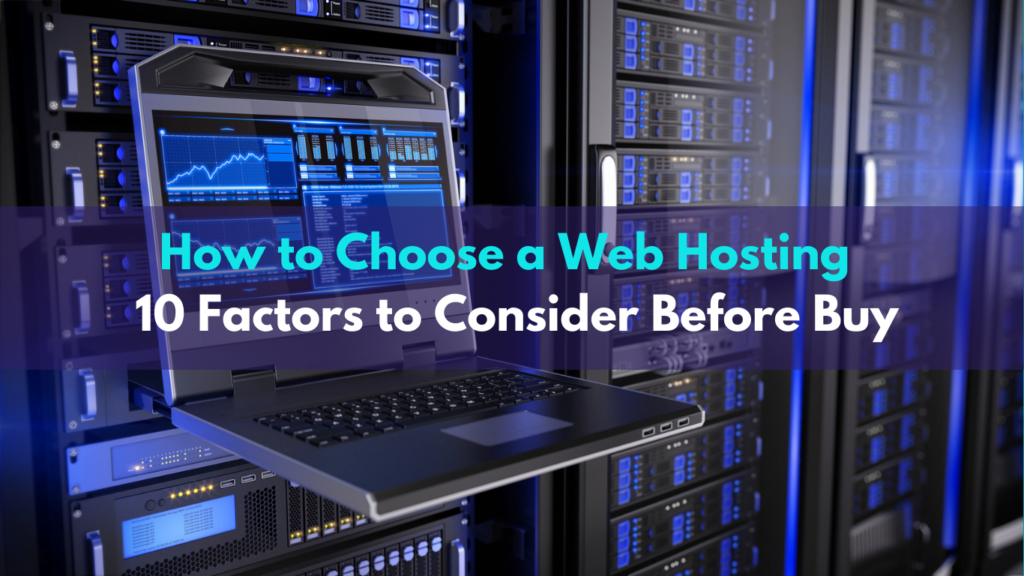Web Hosting is the foundation of your website and asking questions when choose a web hosting service provider is crucial. You can’t simply rely on any web hosting especially in times when there are lots of cheap providers available in the market selling their services at competitive prices.
You need to think of finding the best web hosting that could fit your online needs because not every host can serve the right purpose to you when it comes to their features. The most significant job your web hosting provider has is to keep your website online, secure, and fast by maintaining a high uptime or eliminating downtime as much as possible so that your potential customers always get a top-quality experience. Moreover, in the case any issue appears, timely support by customer service professionals must be available 24/7 to get an instant solution or answers to your questions.
So, if you are wondering how do I choose the right web hosting that is reliable and can be trusted, check out these 10 questions to ask while picking up your web hosting.
1. What kind of server reliability and uptime scores do you offer?
99.5% is the recommended uptime score and below 99% uptime is unacceptable. So, make sure to ask your web host about their server reliability and uptime because having 24/7 availability is important.
A powerful server and stable network connections are the core of any great web hosting service provider. To know whether your hosting has been set up on powerful servers, you can use monitoring tools. Monitoring also helps you with tracking the performance of your web hosting provider. With super server reliability and fast loading Speed, your website always up and help in ranking
2. What’s Your Security Policy?

Website security has major importance to let users get a secured experience on your website. Lack of security can affect your business sales and conversions and even end up with a high bounce rate. So, make sure to understand your web hosting provider’s security policy. Know what security features they offer.
The policy of a hosting provider should address the details of the security no matter whether it is shared hosting or dedicated hosting.
You can ask your company how often do they conduct malware or virus scans. Moreover, you can also check your hosting provider has SSL certification that protects any sensitive data.
An eCommerce website that stores critical customer data should focus on offering a good shared secure socket layer (SSL) certificate. Make sure your SSL certificate covers all the security provisions. If not, a third-party SSL provider can be your perfect helper to keep your website security in check
3. Do You Provide Multiple Add-on Domains?
Ask your hosting provider if they allow you to add multiple domains on the same hosting plan. Many of us handle more than 2 or 3 domains at once and you’ll need to make sure that you buy a hosting that can help you accommodate these extra domains.
Thus, it is best to check the domain capacity of the hosting plan you choose. Generally, hosting companies decide the limit of add on domains to one account but some web host lacks this feature. So, be sure to know your hosting company well enough before you make your purchase
4. Do you perform backups?
Backup secures the original data. Make sure to ask your web hosting provider to handle your website backups more often than not. Backups will help you prevent losing critical data due to the most recent backup was taken. Avoid getting service with a web host that doesn’t allow backups of your database at least once a day.
5. Do they offer free Web Site Migration assistance?

Make sure your web hosting provider also comes with migration assistance. Choosing a web hosting provider who can handle migration works of your websites and servers helps with migrating email, databases, plugins, theme, websites, and other applications.
6. What can you do when there is downtime?
Another question that you can ask when choosing web hosting is if they can take responsibility for downtimes even when circumstances get out of control. This way you’ll know if your hosting provider can help you recover your data in unforeseen events such as power outages or weather disturbances.
7. How responsive are your customer service and tech support?
Customer service is a crucial part of any business, and tech support helps in resolving significant server issues. So, before choosing your web hosting provider, ask your web hosting if they ensure timely support in times of any issue.
Even more, you can also contact other customers for feedback to know how their satisfaction was with the company and the quality of their service. A 24/7 availability of technical support is also essential. Make sure to know what their average resolution and response time is.
8. Do you provide a money-back guarantee?
A money-back guarantee gives a sense of credibility in the eyes of customers. Don’t forget to ask your web host about their money-back guarantee policy because many web hosts aren’t as responsive as others to the customers’ requests and issues.
Make sure to invest in a company that can stay with what they say and promise. Remember, if they don’t offer a “30-day money-back guarantee”, move on to find another hosting company.
If any case you want to cancel their subscription after purchase, they should be able to give you a complete refund.
9. How many websites are on each server?

Shared hosting means you would be sharing the same server with many other websites. So, when opting for shared hosting, you should ask your web hosting provider this question i.e., “how many websites are on each server”? because the more the number of websites on the server will be, the more will be the effect on your website in terms of speed.
So, ask your hosting provider the number of customers shared that each server.
10. What are you accountable for?
When it comes to downtime, your company should hold the responsibility of keeping your website online for your users.
They may not be accountable when a power outage occurs, because it can go beyond their control. But in such cases, it’s good to ask whether charges would be suspended.
Conclusion for Choose a Web Hosting
There are lots of web hosting providers available to you like Bluehost, SiteGround & Hostgator, you must choose a web hosting one that fits the scale of your business and which fulfills all your wishes. To know how reliable and responsible they are for their services, create some essential questions to ask before you select the best web hosting service that aligns with your website.



